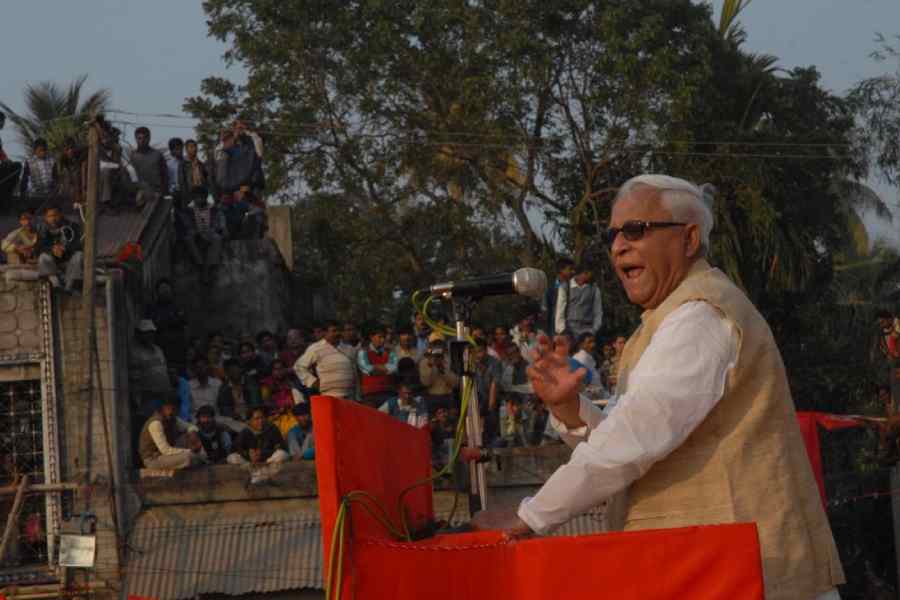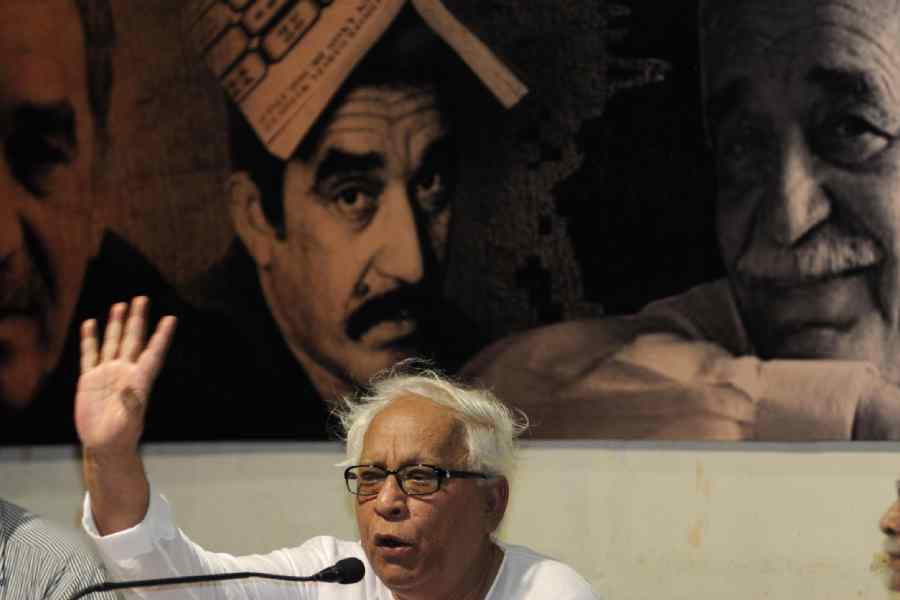Buddhadeb Bhattacharjee, the former Marxist chief minister in classic bhadralok attire whose gentle manner hid a steel that emboldened him to plough a lonely furrow on Bengal’s long dried-up industrial landscape, died at his Palm Avenue home on Thursday. He was 80.
The CPM veteran had been suffering from pulmonary ailments that had kept him away from active politics for half a decade and often required him to be rushed to hospital.
As the news of his death spread, ordinary people as much as Bengal’s intelligentsia mourned the passing of a leader known for a simple lifestyle disdainful of the trappings of power but steeped in love for books, films and theatre, closeness to the cultural fraternity, and a profound appreciation of the Latin American literary giant, Gabriel Garcia Marquez.
Shortly after breakfast on Thursday, Buddhadeb had developed breathing problems and doctors were called in. He had been running a temperature for the past few days.
“As doctors continued to treat him for his respiratory distress, Buddhada breathed his last at 8.20am,” senior CPM leader Rabin Deb told The Telegraph.
He leaves behind his wife Meera Bhattacharjee and son Suchetan.
His Palm Avenue home — the Marxist had never agreed to move into any chief ministerial “bungalow” — was on Thursday besieged by a crowd of commoners, party members, politicians and celebrities.
To many who knew him and the many more who could not fathom him, Buddhadeb was more a man of letters than an administrator — a poet and author, and a translator of progressive literature including two of Marquez’s works of “non-fiction” — The Story of a Shipwrecked Sailor and Clandestine in Chile.
It was typical of the man that, bang in the middle of a searing general election campaign in 2014, he chose to take time out to deliver a lecture on Marquez at the Press Club here. The novelist had just passed away.
Buddhadeb started off with the disclaimer that he was not a literary critic but spoke luminously about Marquez, on his literature as well as his politics, often adding context to the author’s works with anecdotes.
Buddhadeb was born on March 1, 1944, to a north Calcutta family, heir as much to the religious legacy of his grandfather Krishnachandra Smrititirtha as to the revolutionary spirit of his late uncle and poet Sukanta Bhattacharya.

Buddhadeb Bhattacharjee addresses a rally in Singur in January 2011 Sourced by The Telegraph
When the time came, a young Buddhadeb sided with the uncle, leaving his postgraduate studies at Presidency College to join the CPM in 1966. Apprenticeship in Marxist discipline came from the redoubtable Bengal party secretary, Promode Dasgupta or PDG.
Considered a PDG protégé, he rose through the ranks of the student and youth organisations. He won the Kashipur-Belgachia Assembly seat in 1977, becoming minister of information and public relations in Jyoti Basu’s first Left Front government, aged just 33.
Except for an interlude caused by electoral defeat in 1982, and a brief one he owed to his conscience in the early 1990s, he was a constant presence in the Bengal cabinet from 1977 to 2011.
And when he stepped down as minister in 1993 in a huff without taking the party into confidence, he was persuaded to rejoin the Basu cabinet by the following year.
His stature in the party continued to grow and when Basu relinquished office in November 2000 after a 23-year stint, Buddhadeb seemed the natural heir.
His ascent to the top chair was marked by an emphasis on industrialisation to try and bring jobs to an employment-starved state. His slogan was “Krishi aamader bhitti, shilpo aamader bhobishyat (Agriculture is our foundation, industry our future).”
It was a policy that not just turned away many within his party, but whose implementation boomeranged and shook the foundations of the Left Front government, ending its 34-year rule in 2011.
Electoral success may have eluded him in the end, but the last of Buddhadeb’s three stints — from 2006 to 2011 — will be remembered for his attempts to turn around the fallow industrial scene in Bengal.
Buddhadeb, who in his media and party interactions repeatedly regretted the lack of employment opportunities in the state, had planned a combined package of the service sector — IT and ITeS — and manufacturing to generate jobs.
“He did not want the educated youth leaving the state in trainloads in search of jobs,” said a CPM veteran standing outside the Palm Avenue residence.
“That’s why he reached out to the IT biggies like Azim Premji and N.R. Narayana Murthy, while inviting manufacturing majors like the Tatas and Jindals to the state. He had an able lieutenant in his industry minister, (the late) Nirupam Sen.”
Under Buddhadeb’s stewardship, an IT policy was formulated meticulously in 2003, paving the way for a remarkable 70 per cent surge in the industry between 2001 and 2005.
Riding a pro-Buddhadeb storm in the 2006 Assembly polls, with the political horizon seemingly cloudless, the third-term chief minister geared up to implement his dream.
With Ratan Tata by his side at Writers’ Buildings, he announced a grand automobile project at Singur that he said would attract ancillaries to create a large pool of jobs.
But that was not to be. Building large manufacturing units requires large tracts of land — which is largely fertile in most parts of Bengal and divided into small ownership parcels. And a large section of the land losers was unhappy when the government acquitted their plots for Tata’sNano factory.
This sentiment was picked up by the anti-land acquisition movement led by the then Opposition leader, Mamata Banerjee, with support from the extreme Left and the Right.
Unbelievably, an almost-ready automobile plant was lost to Gujarat, Ratan Tata dismantling the unit into bits and pieces and transferring them to Sanand. As the trucks rolled out of Singur, they seemed to be running over the big plans that Buddhadeb had pushed, partly against opposition from within his party.
If anything was still left of the dream, it lay in ruins on March 14, 2007, when the police opened fire and killed villagers opposed to land acquisition in the East Midnapore pocket of Nandigram. When alleged killings by the CPM rocked Netai, the epitaph seemed to have been written for the Left government.
The Left’s slide had begun in the 2008 panchayat polls, when it lost South 24-Parganas and East Midnapore. Subsequent elections saw a continuing erosion in the Left’s vote share.
Amid this, Maoist violence escalated. Buddhadeb and then Union minister Ram Vilas Paswan escaped a blast in November 2008 when their convoy was on the way to a stone-laying ceremony for the Jindal steel project in Salboni, West Midnapore (now in Jhargram). Eventually, this project too failed to take shape.
“Buddhada could be criticised for his dependence on the bureaucracy at the cost of the party, but his efforts were as honest as his life,” a CPM leader said.
The first part of the comment was an echo of what Jyoti Basu had said during the Singur strife: “Was the Krishak Sabha taken into confidence?”
If his land-acquisition methods remain an irritant for some Marxists, no one can fault him over his uncompromising opposition to the BJP-RSS.
In his last speech at the Brigade Parade Grounds in 2015, before his failing health kept him off the grind of active politics, Buddhadeb said: “The condition of the country is not good. BJP is spreading hatred and trying to burn the country’s spirit with hatred. The first fight is against the BJP. So BJP hatao, desh bachao.”
The exhortation sounds even more relevant today when some in his party face accusations of playing down the saffron threat in their eagerness to target the Mamata government.











